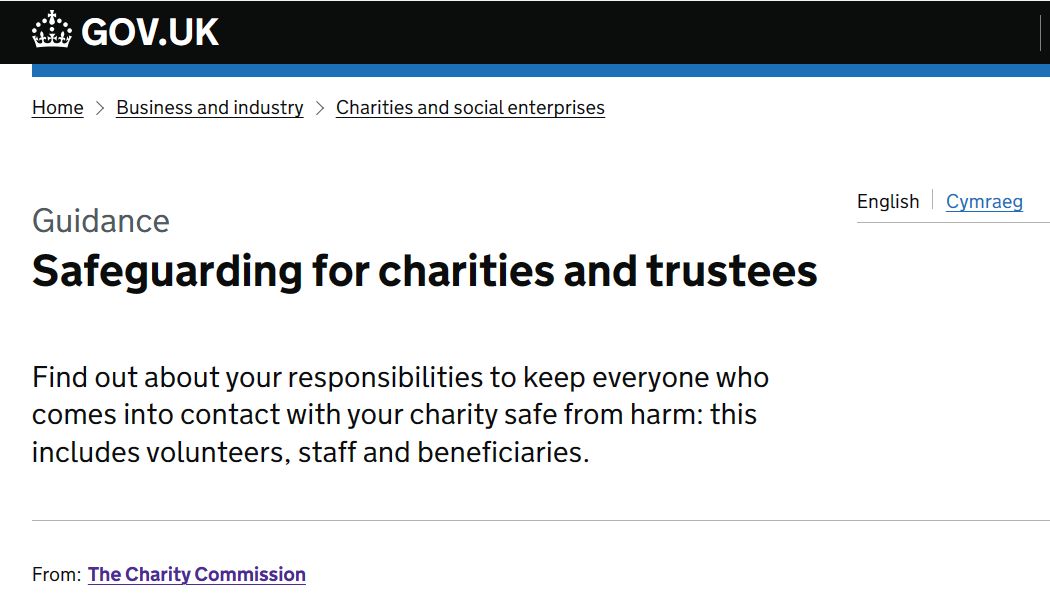
Safeguarding is for everyone!
Safeguarding for Jewish Charities
The Charity Commission for England & Wales is clear that safeguarding:
applies to every charity, not just those dealing with children or adults at risk
concerns the well-being of every person connected to a charity, not just beneficiaries
is the responsibility of every charity trustee – not just a designated few
Trustees have overall responsibility for safeguarding in charities, even if they delegate some activities to a safeguarding lead or group.
You must ensure your organisation has robust safeguarding policies in place which everyone follows.
Safeguarding policies should never be ‘cut and paste’. They must always based on the risks to people you come into contact with and be responsive to changing circumstances.
Everyone involved with a charity should know how to recognise, respond to, report and record a safeguarding concern.
Charity Commission’s main safeguarding guidance
Keep it simple
Safeguarding needn’t be rocket science. We want to help demystify it.
The Charity Commission for England & Wales also provides a shorter, 5-minute guide on safeguarding for charities and trustees. All trustees should read this guidance as a starting point.
The guidance sets out 5 key steps trustees need to take:
1. Identify and manage risks
2. Have suitable policies and practices in place
3. Carry out necessary checks on staff and volunteers
4. Protect your staff and volunteers
5. Handle and report incidents appropriately
1. Identify & Manage Risks
2. Have suitable policies and practices in place
3. Carry out necessary checks on staff and volunteers
DBS Checks
4. Protect your staff and volunteers
5. Handle and reports incidents appropriately
If a crime is in progress, or somebody is in immediate danger, contact the police straight away using 999
Other Resources
Please note
While every attempt has been made to provide guidance from reputable and expert sources, the JLC does not accept any responsibility for any content in, or use of, third-party sources. Trustees and other charity representatives should always apply guidance in line with their charity’s specific circumstances (including all legal and best practice requirements), taking professional advice as appropriate.
For guidance and support on issues affecting a child’s safety or well-being, contact the NSPCC helpline. Click on the image below for further information.
Safeguarding in Synagogues and Community Spaces
Many Jewish charities are based in a physical location - like synagogues & community spaces.
These spaces may have additional safeguarding risks. For example:
an ‘open door’ policy, allowing members of the public to come and go easily
running activities for children or adults at risk at their premises
running ‘off-site’ activities like meetings in people’s homes, or residential trips
Where charities form part of wider communities, it may be more difficult for victims to come forward due to connections within the community.
Trustees need to properly assess and manage the risks of harm to anybody who comes into contact with the charity, whether on the charity’s premises or elsewhere.
All external content will reopen in a new window
Additional safeguarding guidance for synagogues and community spaces
Keeping children safe in out of school settings
Safeguarding guidance for organisations/individuals providing extra-curricular training, tuition, or community clubs and activities (including settings run by synagogues or community spaces, whether on their premises or elsewhere).
Youth Work: Safeguarding and Risk Management Hub
Guidance and resource hub for youth workers from the National Youth Agency (NYA)
Safeguarding in Sports
Provides information on safeguarding in sport, including responding to incidents. Includes links to self-assessments for independent and community sport and physical activity providers.
DBS Checks - eligibilty in synagogues and yeshivas
What level of DBS are staff & volunteers in synagogues & yeshivas eligible for?
Guidance broken down by role (eg Rabbi/security guard/children’s service leader etc)
Safeguarding concerns: practice examples
Scenario-based guidance from the NSPCC on common child protection concerns & steps to take
Includes: Hiring out spaces; Parent volunteers; Residential trips and more
Guidance for Secure Livestreaming
Community Security Trust guidance on keeping livestreaming secure from online disruption, including antisemitism.
Grant making charities
Many charities, including many Jewish charities, make grants to partners, both in the UK and overseas.
The Charity Commission is clear that it will still hold the trustees to account when their charity uses partners to achieve their objectives.
As part of their risk assessment and management when working with a partner (often referred to as ‘due diligence’) trustees need to take reasonable steps to ensure that their partners have adequate safeguarding measures in place.
Trustees are also required to report serious safeguarding incidents that involve activities they have funded to the Charity Commission.
Additional safeguarding guidance when working with partners:
(All external content will reopen in a new window)
Tip Sheet
‘Conducting safeguarding due diligence checks on organisations or individuals you are contracting to provide services.’
Foreign, Commonwealth & Development Office (FCDO) guidance for organisations coming into contact with children
This guidance is aimed at programmes funded by the FCDO. However, the information (including the child safeguarding policy questions) may be useful for charities wishing to assess a partner’s safeguarding arrangements.
Reporting a serious incident in your charity when it involves a partner
Guidance for charity trustees on when to report incidents which involve the charity’s partners to the Charity Commission as a serious incident (both in the UK and overseas).
“Safeguarding is a key governance priority. Therefore any failure by trustees to carry out adequate due diligence of the charity’s partners to ensure they adequately manage risks to vulnerable groups, would be of serious regulatory concern to the Commission.”
— Charity Commission: Compliance Toolkit Chapter 2, Due Diligence and Monitoring





























